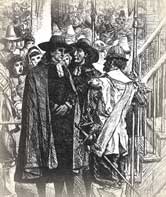
Word of the Day: Aberration
Today’s word of the day, courtesy of Words Coach (https://www.wordscoach.com/dictionary) is aberration. Pronounced / ˌæb əˈreɪ ʃən /, the word is a noun that means “the act of departing from the right, normal, or usual course,” or “an instance of deviating from the ordinary, usual, or normal type,” or “deviation from truth or from good ethics,” or “a departure from sound thinking; lapse in judgment” (https://www.dictionary.com/browse/aberration). It also has several specialized meanings, or meanings that are specific to an academic discipline. In his 1755 Dictionary, Samuel Johnson gave only one meaning, “The act of deviating from the common track” (https://johnsonsdictionaryonline.com/views/search.php?term=aberration).
According to Etymonline.com, the word entered the English language in the “1590s, ‘a wandering, act of straying,’ from Latin aberrationem (nominative aberratio) ‘a wandering,’ noun of action from past-participle stem of aberrare ‘to wander out of the way, lose the way, go astray,’ literally and figuratively, from ab ‘off, away from’ (see ab-) + errare ‘to wander, stray, roam, rove’ (see err). Meaning ‘deviation from the normal type’ is attested by 1735” (https://www.etymonline.com/search?q=aberration). It’s interesting that err comes from the Latin errare “’wander, go astray,’ figuratively ‘be in error,’ from PIE root *ers- (1) ‘be in motion, wander around’” (https://www.etymonline.com/word/err). It makes it sound as if moving around to our Indo-European ancestors was a mistake.
According to the On This Day website, on this date in 1656, “The first Quakers to land in Boston, Englishwomen Ann Austin and Mary Fisher, are arrested and jailed by the Puritan colonial government. After 5 weeks of imprisonment, they are deported back to Barbados”
The Quakers, or more properly the Religious Society of Friends, are a Christian denomination that began in England around 1650, started by George Fox. “In 1650, Fox was brought before the magistrates Gervase Bennet and Nathaniel Barton, on a charge of religious blasphemy. According to Fox’s autobiography, Bennet ‘was the first that called us Quakers, because I bade them tremble at the word of the Lord’. It is thought that Fox was referring to Isaiah 66:2 or Ezra 9:4. Thus the name Quaker began as a way of ridiculing Fox’s admonition, but became widely accepted and used by some Quakers” (https://en.wikipedia.org/wiki/Quakers).
The Quakers were quick to start spreading their message, which led them into trouble throughout England. But they also went to the New World. Ann Austin and Mary Fisher raised funds among the Friends to cross the pond. First, they “sailed to Barbados in the Caribbean where they were well received[3] and where they converted the Lieutenant Governor of the island to Quakerism” (https://en.wikipedia.org/wiki/Ann_Austin). After that, however, things didn’t go so well.
They sailed to Boston in the Massachusetts Bay Colony. “There they met with fierce hostility from the Puritan population and the Deputy Governor of the colony, Richard Bellingham, as news of the heretical views of the Quakers had preceded them” (ibid.). And they weren’t just “arrested and jailed.” “They were forced to undress in public, and their bodies were intimately examined for signs of witchcraft…. Their books and pamphlets were seized and burned by the Boston hangman.[5] An innkeeper, Nicholas Upsall, offered to pay their fines if he were permitted to speak with them in prison[6] but the magistrates, having ordered their prison window to be boarded up so as to isolate them refused his request, the intention being to starve them to death.[7] Upsall then bribed their warder by paying him five shillings a week to allow him to bring food to the women and so saved their lives. Fisher and Austin were deported back to Barbados on the Swallow after five weeks’ imprisonment, having been unable to share their faith with anyone except Upsall, who became the first North American Puritan convert to Quakerism” (ibid.).
Austin later died in prison in England in 1665. Fisher, after witnessing to the Sultan Mehmed the Fourth of the Ottoman empire, eventually moved to Charleston, South Carolina where there was a small community of Friends and where she died sometime in 1698 (https://en.wikipedia.org/wiki/Mary_Fisher_(missionary)). Nicholas Upsall, from his experience with Austin and Fisher, became a Quaker, along with some others in the Puritan community, and suffered for his conversion. He died in 1666 (https://en.wikipedia.org/wiki/Nicholas_Upsall).
If you grew up learning in your American history class that the Puritans came to New England in order to experience religious freedom, you might think that the treatment of Ann Austin and Mary Fisher is an aberration, and you would be right and wrong. If you use the first definition, “the act of departing from the right, normal, or usual course,” you would be wrong; the treatment of Austin and Fisher was par for the course in Puritan New England. If you use the third definition, “deviation from truth or from good ethics,” you would be spot on.
The image today is of the arrest of Ann Austin and Mary Fisher (https://www.christianity.com/church/church-history/timeline/1601-1700/ann-austin-and-mary-fisher-arrested-11630129.html).